Google’s Danny Sullivan answered a question on Twitter Amazon dominating 9 out of ten search results for a query. It gives the appearance that Google has a domain diversity problem.
Someone posted a screenshot showing Amazon ranking nine web pages in ten search results for the query, 3 foot usb-c cables.
This is the tweet:
Did the domain diversity update break? @dannysullivan pic.twitter.com/RXxo1ylUde
— Dave Coppedge (@djcoppedge) July 23, 2020
Google’s Danny Sullivan Says It’s Not Broken
Google’s Danny Sullivan answered that Google’s algorithm isn’t broken but promised to take it back to Google to review.
No, it's not broken. That's why you don't see it happening widespread that there's more than two listings for the same domain across a range of searches. Sometimes we show more. In this case, we should be doing a better job. I'll pass it on.
— Danny Sullivan (@dannysullivan) July 23, 2020
Maybe the Problem is Not Google
If you do a site search of tech supply site NewEgg.com for “usb-c cables 3ft” you get a search result like this:
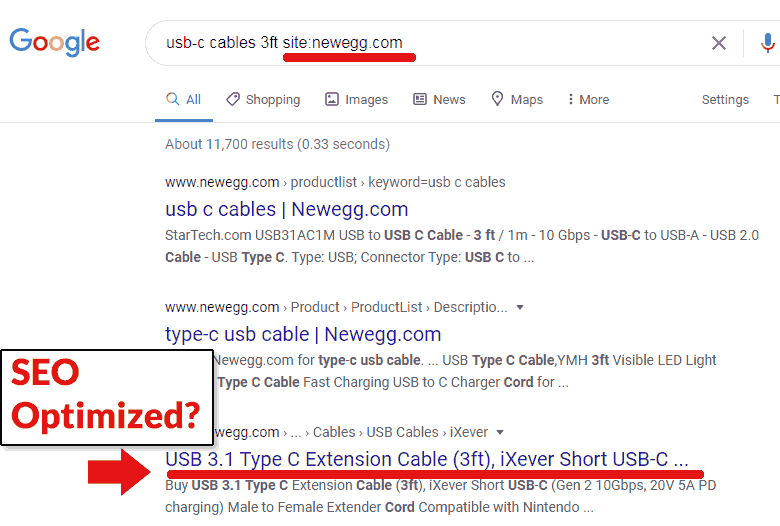
Here is the NewEgg title tag:
USB 3.1 Type C Extension Cable (3ft), iXever Short USB-C (Gen 2 10Gbps, 20V 5A PD charging) Male to Female Extender Cord Compatible with Nintendo Switch, MacBook, Pro Pixel 3 2 XL – Newegg.com
That’s arguably their best page for the keyword phrase, “usb-c cables 3ft” and the title tag isn’t really optimized for that keyword phrase.
Here is a site search of Walmart.
The screenshot is of the top result, but all the other results from Walmart were similar to the top result in terms of optimizing for the keyword phrase, “usb-c cables 3ft”
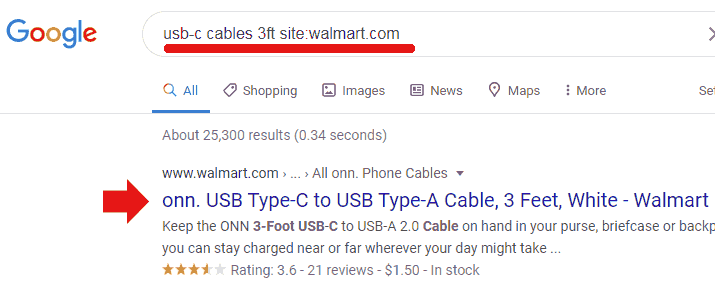
Walmart has some of the best SEO of any online store.
Yet even Walmart isn’t well optimized for the search phrase, “usb-c cables 3ft”
Is Amazon dominating because they have better SEO?
Not really.
What Does Bing Say?
When I am trying to diagnose an issue related to Google search rankings, I take a look at Bing for insights.
Sometimes Bing will show very different and better results. That can indicate that something is going wrong over at Google.
For the keyword phrase “usb-c cables 3ft” Bing shows six organic search results on the first page of the SERPs.
Out of those six organic search results, four of the positions belong to Amazon.
Oh wow! What is going on, right?
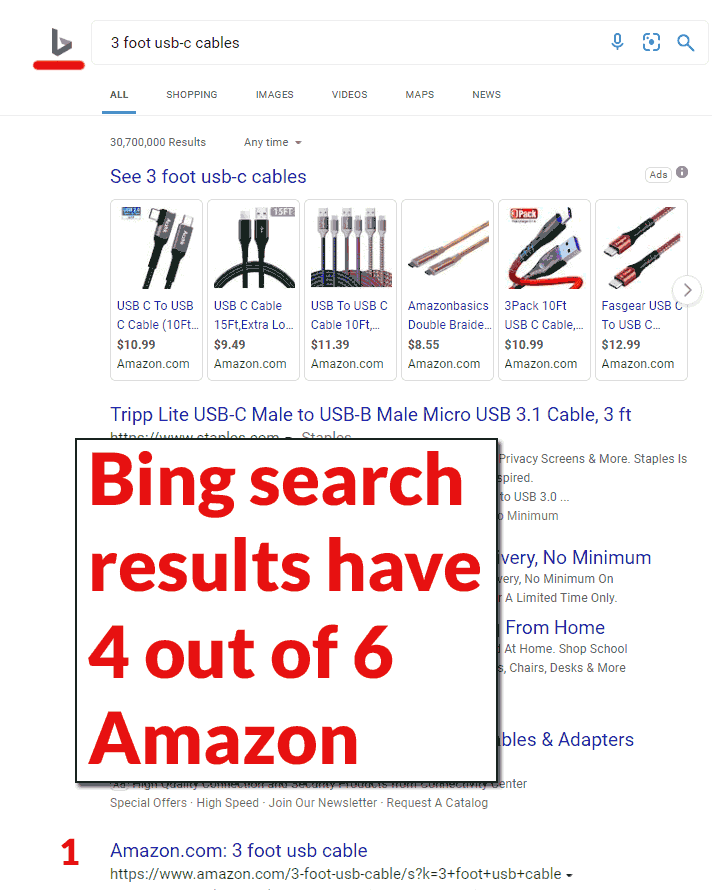
Maybe It’s Not Domain Diversity
There’s a joke that goes like this:
“Let’s stop talking about you and let’s talk about me.”
Similarly, when we talk about Google’s SERPs, we sometimes tend to become Google-centered and forget to consider that maybe the problem isn’t Google, that maybe the problem is outside of Google.
In this case, the real problem wasn’t Google, the problem appeared to be that web pages were not optimized for the search term.
Is that because Amazon has better SEO?
Probably not.
The USB-C spec is relatively new. There are more devices using regular USB cables than use the USB-C type.
Less People Use USB-C than Use Regular USB Cables
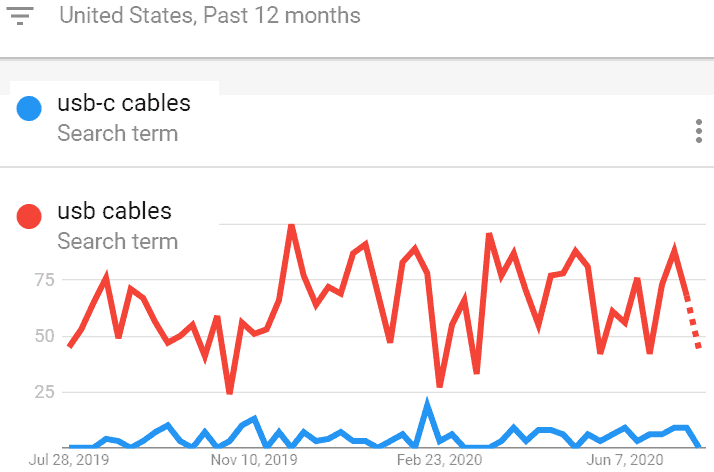
There are significantly more people using Apple Lightning Cables than are using USB-C Cables.
But more importantly, nobody really searches for usb-c cables 3ft.
No Search Volume for USB-C Cables 3ft
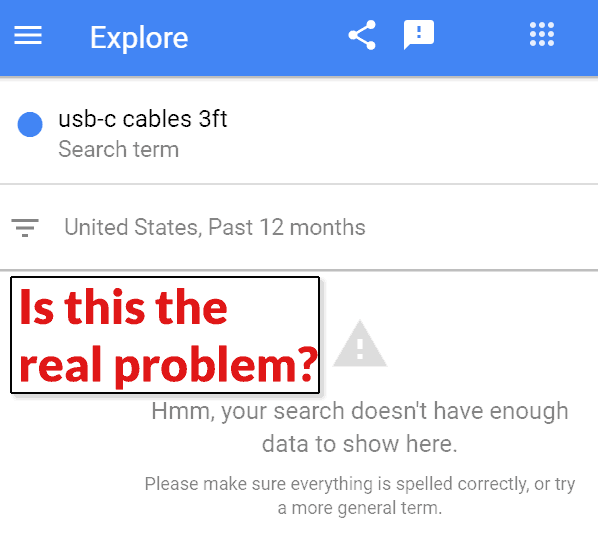 This screenshot shows that there is very little keyword volume for the search phrase that triggers SERPs that show Amazon dominating the top ten results.
This screenshot shows that there is very little keyword volume for the search phrase that triggers SERPs that show Amazon dominating the top ten results.But a lot of people search for USB-C Cables
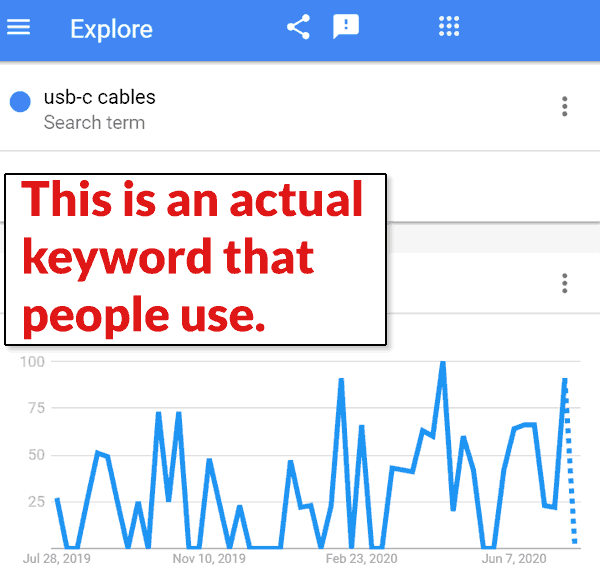
And if you search Google for USB-C Cables, you will find there are nine organic search results and out of those nine, only one result belongs to Amazon.
The reason why is probably because a lack of data. Google needs data in order to understand search queries.
So if nobody’s using a search query, then it becomes harder to understand what is meant. As you can see, both Bing and Google defaulted to Amazon.
Google’s Not Broken. It’s an Oddball Search Query
Obviously, no search result should have nine search results from the same domain name.
Yet, when confronted with a search query nobody uses, this is the kind of thing that happens.
It’s super important to keep an open mind when diagnosing the search results. Otherwise the real reason a site does not rank will be elusive.
This “problem” of a Google problem with domain diversity could very well be simply an issue related to the keyword phase used to trigger this kind of result.
Sure it’s a bug, but this one phrase is not evidence of a widespread problem with Google’s SERPs and domain diversity.





![[SEO, PPC & Attribution] Unlocking The Power Of Offline Marketing In A Digital World](https://www.searchenginejournal.com/wp-content/uploads/2025/03/sidebar1x-534.png)